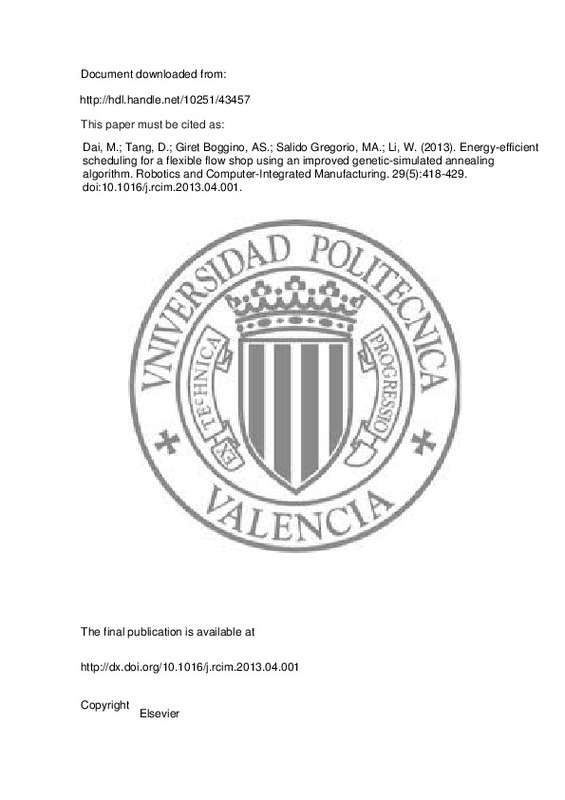JavaScript is disabled for your browser. Some features of this site may not work without it.
Buscar en RiuNet
Listar
Mi cuenta
Estadísticas
Ayuda RiuNet
Admin. UPV
Energy-efficient scheduling for a flexible flow shop using an improved genetic-simulated annealing algorithm
Mostrar el registro sencillo del ítem
Ficheros en el ítem
| dc.contributor.author | Dai, Min
|
es_ES |
| dc.contributor.author | Tang, Dunbing
|
es_ES |
| dc.contributor.author | Giret Boggino, Adriana Susana
|
es_ES |
| dc.contributor.author | Salido Gregorio, Miguel Angel
|
es_ES |
| dc.contributor.author | Li, W.D.
|
es_ES |
| dc.date.accessioned | 2014-10-21T15:38:32Z | |
| dc.date.available | 2014-10-21T15:38:32Z | |
| dc.date.issued | 2013-11 | |
| dc.identifier.issn | 0736-5845 | |
| dc.identifier.uri | http://hdl.handle.net/10251/43457 | |
| dc.description | This is the author’s version of a work that was accepted for publication in Robotics and Computer-Integrated Manufacturing. Changes resulting from the publishing process, such as peer review, editing, corrections, structural formatting, and other quality control mechanisms may not be reflected in this document. Changes may have been made to this work since it was submitted for publication. A definitive version was subsequently published in Robotics and Computer-Integrated Manufacturing, [Volume 29, Issue 5, October 2013, Pages 418–429] DOI10.1016/j.rcim.2013.04.001 | es_ES |
| dc.description.abstract | [EN] The traditional production scheduling problem considers performance indicators such as processing time, cost and quality as optimization objectives in manufacturing systems; however, it does not take energy consumption and environmental impacts into account completely. Therefore, this paper proposes an energy-efficient model for flexible flow-shop scheduling (FFS). First, a mathematical model for a FFS problem, which is based on an energy-efficient mechanism, is described to solve multi-objective optimization. Since FFS is well known as the NPhard problem, an improved genetic-simulated annealing algorithm is adopted to make a significant trade-off between the makespan and the total energy consumption for implementing a feasible scheduling. Finally, a case study of production scheduling problem for metalworking workshop in a plant is simulated. The experimental results show the relationship between the makespan and the energy consumption is conflicting apparently. Moreover, an energy saving decision is performed in a feasible scheduling. Using the decision method, there can be a significant potential to minimize energy consumption while complying with the conflicting relationship | es_ES |
| dc.description.sponsorship | This research was carried out as a part of the CASES project which is supported by a Marie Curie International Research Staff Exchange Scheme Fellowship within the 7th European Community Framework Program under the Grant agreement no 294931. This research was also supported by National Science Foundation of China (No. 51175262), Jiangsu Province Science Foundation for Excellent Youths (No. BK201210111), Jiangsu Province Industry-Academy-Research Grant (No. BY201220116), the NUAA Fundamental Research Fund (No. NS2013053), the Project Funded by Priority Academic Program Development of Jiangsu Higher Education Institutions (PAPD), and the research project TIN2010-20976-C02-01 (Ministry of Science and Innovation, Spain). | en_EN |
| dc.language | Inglés | es_ES |
| dc.publisher | Elsevier | es_ES |
| dc.relation.ispartof | Robotics and Computer-Integrated Manufacturing | es_ES |
| dc.rights | Reserva de todos los derechos | es_ES |
| dc.subject | Flexible flow-shop scheduling (FFS) | es_ES |
| dc.subject | Energy consumption | es_ES |
| dc.subject | Energy saving | es_ES |
| dc.subject | Makespan | es_ES |
| dc.subject | Genetic-simulated annealing algorithm | es_ES |
| dc.subject.classification | LENGUAJES Y SISTEMAS INFORMATICOS | es_ES |
| dc.title | Energy-efficient scheduling for a flexible flow shop using an improved genetic-simulated annealing algorithm | es_ES |
| dc.type | Artículo | es_ES |
| dc.identifier.doi | 10.1016/j.rcim.2013.04.001 | |
| dc.relation.projectID | info:eu-repo/grantAgreement/EC/FP7/294931/EU/Customised Advisory Services for Energy-efficient Manufacturing Systems/ | es_ES |
| dc.relation.projectID | info:eu-repo/grantAgreement/MICINN//TIN2010-20976-C02-01/ES/TECNICAS PARA LA EVALUACION Y OBTENCION DE SOLUCIONES ESTABLES Y ROBUSTAS EN PROBLEMAS DE OPTIMIZACION Y SATISFACCION DE RESTRICCIONES/ | es_ES |
| dc.rights.accessRights | Abierto | es_ES |
| dc.contributor.affiliation | Universitat Politècnica de València. Departamento de Sistemas Informáticos y Computación - Departament de Sistemes Informàtics i Computació | es_ES |
| dc.description.bibliographicCitation | Dai, M.; Tang, D.; Giret Boggino, AS.; Salido Gregorio, MA.; Li, W. (2013). Energy-efficient scheduling for a flexible flow shop using an improved genetic-simulated annealing algorithm. Robotics and Computer-Integrated Manufacturing. 29(5):418-429. https://doi.org/10.1016/j.rcim.2013.04.001 | es_ES |
| dc.description.accrualMethod | S | es_ES |
| dc.relation.publisherversion | http://dx.doi.org/10.1016/j.rcim.2013.04.001 | es_ES |
| dc.description.upvformatpinicio | 418 | es_ES |
| dc.description.upvformatpfin | 429 | es_ES |
| dc.type.version | info:eu-repo/semantics/publishedVersion | es_ES |
| dc.description.volume | 29 | es_ES |
| dc.description.issue | 5 | es_ES |
| dc.relation.senia | 245129 | |
| dc.contributor.funder | European Commission | |
| dc.contributor.funder | National Science Foundation, China | |
| dc.contributor.funder | Ministerio de Ciencia e Innovación |







![[Cerrado]](/themes/UPV/images/candado.png)

